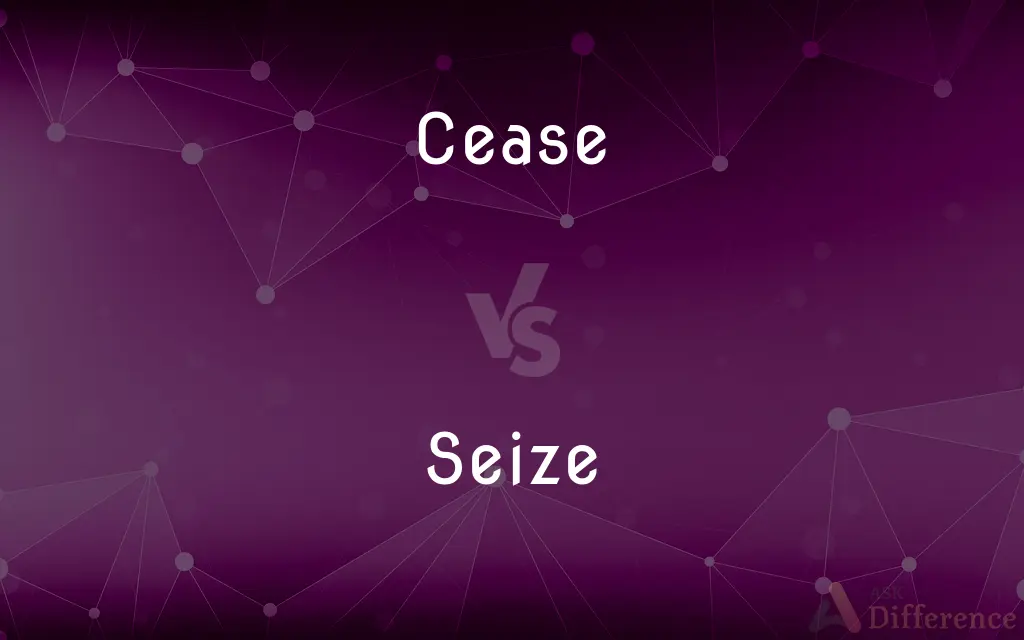Cease vs. Seize — What's the Difference?
By Maham Liaqat & Urooj Arif — Updated on March 12, 2024
Cease means to stop or end something, while seize involves taking hold of something forcefully or with legal authority.

Difference Between Cease and Seize
Table of Contents
ADVERTISEMENT
Key Differences
Cease is a verb that means to bring or come to an end, halt, or discontinue an action or process. For instance, when a company decides to cease operations, it means it is stopping its business activities entirely. The term is often used in formal contexts or legal situations, indicating the termination of actions, events, or processes. Seize, on the other hand, implies taking control of something quickly and forcefully, often with a sense of urgency or authority. This could involve physically grabbing something, as in a police officer seizing contraband, or it can be more metaphorical, like seizing an opportunity, meaning to take advantage of it promptly and decisively.
While "cease" conveys the idea of stopping or ending, suggesting a removal of action or halting a process, "seize" is about acquisition, control, or taking action. This fundamental difference highlights the distinct nature of each verb, with "cease" focused on the cessation of activities and "seize" on the act of taking or claiming.
Both terms are used in specific contexts that define their meanings more clearly. For example, a cease and desist order in legal terms means to stop any allegedly illegal activity, while seizing assets in a legal context refers to the confiscation of property by authorities. Despite their differences, both terms imply a definitive action, whether it is bringing something to an end or taking control of something.
Despite their contrasting meanings, cease and seize can sometimes be related in the context of actions and consequences. For example, failing to cease certain behaviors or activities might lead to authorities seizing property or assets as a punitive measure. This interplay underscores the potential for one action to lead to another in legal and authoritative contexts.
Comparison Chart
Meaning
To stop or end something.
To take hold of something forcefully or with legal authority.
ADVERTISEMENT
Usage
Often used in formal or legal contexts to indicate the termination of actions or processes.
Implies taking control or possession quickly and forcefully, or taking advantage of opportunities.
Contexts
Stopping business operations, ending a process, or halting activities.
Confiscating property, taking control of situations, or grabbing opportunities.
Connotation
Conveys a removal of action or cessation of activities.
Focuses on acquisition, control, or decisive action.
Related Actions
Can be a voluntary decision or mandated by authorities.
Often involves authority, urgency, or decisiveness in action.
Compare with Definitions
Cease
To bring an activity or process to an end.
The company decided to cease production due to declining sales.
Seize
To take hold of something forcefully or authoritatively.
The police seized the stolen goods during the raid.
Cease
To halt operations or services.
The restaurant will cease operations at the end of the month due to financial difficulties.
Seize
In legal terms, to confiscate property or assets.
The government seized assets linked to the fraud investigation.
Cease
To discontinue a habit or practice.
He pledged to cease smoking as part of his New Year's resolutions.
Seize
To grasp an opportunity decisively.
She seized the chance to study abroad and broaden her horizons.
Cease
Used in legal contexts to demand an end to certain actions.
The court issued a cease and desist order against the unauthorized use of copyrighted material.
Seize
To take control of a situation or moment.
The team seized the lead in the final moments of the game.
Cease
To stop an occurrence or behavior.
The neighbors agreed to cease their noisy gatherings late at night.
Seize
To overcome or dominate a physical space or entity.
The rebels seized the capital after days of conflict.
Cease
Come or bring to an end
They were asked to cease all military activity
On his retirement the job will cease to exist
The hostilities ceased and normal life was resumed
Seize
Take hold of suddenly and forcibly
He seized hold of the door handle
She jumped up and seized his arm
Cease
To put an end to; discontinue
The factory ceased production.
Seize
Take (an opportunity) eagerly and decisively
He seized his chance to attack as Carr hesitated
Cease
To come to an end; stop
A process that never ceases.
Seize
(of a feeling or pain) affect (someone) suddenly or acutely
He was seized by the most dreadful fear
Cease
To stop performing an activity or action; desist
"fold our wings, / And cease from wanderings" (Tennyson).
Seize
Strongly appeal to or attract (the imagination or attention)
The story of the king's escape seized the public imagination
Cease
Cessation; ceasing
We worked without cease to get the project finished on time.
Seize
(of a machine with moving parts) become jammed
The engine seized up after only three weeks
Cease
To stop.
And with that, his twitching ceased.
Seize
Be in legal possession of
The court is currently seized of custody applications
Cease
To stop doing (something).
And with that, he ceased twitching.
Seize
Fasten or attach (someone or something) to something by binding with turns of rope
Jack was seized to the gun and had his two dozen lashes
Cease
To be wanting; to fail; to pass away, perish.
Seize
To grasp suddenly and forcibly; take or grab
Seize a sword.
Cease
(obsolete) Cessation; extinction (see without cease).
Seize
To take by force; capture or conquer
The kidnappers seized the prince. The invaders seized the city.
Cease
To come to an end; to stop; to leave off or give over; to desist; as, the noise ceased.
Seize
To take quick and forcible possession of; confiscate
The police seized a cache of illegal drugs.
Cease
To be wanting; to fail; to pass away.
The poor shall never cease out of the land.
Seize
To focus the attention or intellect on
Seize an idea and develop it to the fullest extent.
Cease
To put a stop to; to bring to an end.
But he, her fears to ceaseSent down the meek-eyed peace.
Cease, then, this impious rage.
Seize
To make use of (an opportunity, for example).
Cease
Extinction.
Seize
To have a sudden overwhelming effect on
A heinous crime that seized the minds and emotions of the populace.
Cease
(`cease' is a noun only in the phrase `without cease') end
Seize
To overwhelm physically
A person who was seized with a terminal disease.
Cease
Put an end to a state or an activity;
Quit teasing your little brother
Seize
Also seise (sēz) Law To cause (someone) to be in possession of something.
Cease
Have an end, in a temporal, spatial, or quantitative sense; either spatial or metaphorical;
The bronchioles terminate in a capillary bed
Your rights stop where you infringe upon the rights of other
My property ends by the bushes
The symphony ends in a pianissimo
Seize
(Nautical) To bind (a rope) to another, or to a spar, with turns of small line.
Seize
To lay sudden or forcible hold of something.
Seize
To cohere or fuse with another part as a result of high pressure or temperature and restrict or prevent further motion or flow.
Seize
To come to a halt
The talks seized up and were rescheduled.
Seize
To exhibit signs of seizure activity, often with convulsions.
Seize
(transitive) To deliberately take hold of; to grab or capture.
Seize
(transitive) To take advantage of (an opportunity or circumstance).
Seize
(transitive) To take possession of (by force, law etc.).
To seize smuggled goods
To seize a ship after libeling
Seize
(transitive) To have a sudden and powerful effect upon.
A panic seized the crowd
A fever seized him
Seize
To bind, lash or make fast, with several turns of small rope, cord, or small line.
To seize two fish-hooks back to back
To seize or stop one rope on to another
Seize
To fasten, fix.
Seize
(intransitive) To lay hold in seizure, by hands or claws (+ on or upon).
To seize on the neck of a horse
Seize
(intransitive) To have a seizure.
Seize
(intransitive) To bind or lock in position immovably; see also seize up.
Rust caused the engine to seize, never to run again.
Seize
To submit for consideration to a deliberative body.
Seize
(law) (with of) To cause (an action or matter) to be or remain before (a certain judge or court).
This Court will remain seized of this matter.
Seize
Of chocolate: to change suddenly from a fluid to an undesirably hard and gritty texture.
Seize
To fall or rush upon suddenly and lay hold of; to gripe or grasp suddenly; to reach and grasp.
For by no means the high bank he could seize.
Seek you to seize and gripe into your handsThe royalties and rights of banished Hereford?
Seize
To take possession of by force.
At last they seizeThe scepter, and regard not David's sons.
Seize
To invade suddenly; to take sudden hold of; to come upon suddenly; as, a fever seizes a patient.
Hope and deubt alternate seize her seul.
Seize
To take possession of by virtue of a warrant or other legal authority; as, the sheriff seized the debtor's goods.
Seize
To fasten; to fix.
As when a bear hath seized her cruel clawsUpon the carcass of some beast too weak.
Seize
To grap with the mind; to comprehend fully and distinctly; as, to seize an idea.
Seize
To bind or fasten together with a lashing of small stuff, as yarn or marline; as, to seize ropes.
Seize
Take hold of; grab;
The salesclerk quickly seized the money on the counter
She clutched her purse
The mother seized her child by the arm
Birds of prey often seize small mammals
Seize
Take or capture by force;
The terrorists seized the politicians
The rebels threaten to seize civilian hostages
Seize
Take possession of by force, as after an invasion;
The invaders seized the land and property of the inhabitants
The army seized the town
The militia captured the castle
Seize
Take temporary possession of as a security, by legal authority;
The FBI seized the drugs
The customs agents impounded the illegal shipment
The police confiscated the stolen artwork
Seize
Seize and take control without authority and possibly with force; take as one's right or possession;
He assumed to himself the right to fill all positions in the town
He usurped my rights
She seized control of the throne after her husband died
Seize
Hook by a pull on the line;
Strike a fish
Seize
Affect;
Fear seized the prisoners
The patient was seized with unberable pains
He was seized with a dreadful disease
Seize
Capture the attention or imagination of;
This story will grab you
The movie seized my imagination
Common Curiosities
What does it mean to cease something?
To cease something means to stop, end, or discontinue it.
What is a cease and desist order?
A cease and desist order is a legal document instructing an individual or entity to stop alleged illegal activities.
What is an example of seizing something?
Seizing something can involve taking control of property through legal authority, such as law enforcement confiscating illegal items.
What does "seize the moment" mean?
"Seize the moment" means to take full advantage of an opportunity or situation without hesitation.
Can a product be "ceased"?
Yes, production of a product can be "ceased" or stopped, often due to economic reasons or obsolescence.
Can an organization "cease to exist"?
Yes, an organization can "cease to exist" if it dissolves or stops operating entirely.
Can "cease" be used in casual contexts?
While "cease" can be used in casual contexts, it is more commonly found in formal or legal language.
Is "seize" always physical?
"Seize" does not always refer to physical actions; it can also mean taking advantage of opportunities or moments.
Are there any synonyms for "cease"?
Synonyms for "cease" include stop, end, halt, discontinue, and terminate.
How can "seize" be used in a positive context?
"Seize" can be positive when referring to taking opportunities, such as seizing the day or seizing a chance for improvement.
Is "ceasing operations" the same as going out of business?
"Ceasing operations" often means going out of business, but it can also be temporary, depending on the context.
What is asset seizure?
Asset seizure is the process by which authorities confiscate property or assets, typically as part of legal proceedings.
How do "cease" and "seize" relate to each other?
While they are distinct in meaning, failing to "cease" certain actions when ordered may lead to authorities "seizing" assets or taking legal action.
What does it mean to "seize power"?
To "seize power" means to take control of a political or organizational leadership position, often by force or sudden action.
Can "seize" imply legal action?
Yes, "seize" can imply legal action, such as when assets are seized during a legal investigation.
Share Your Discovery

Previous Comparison
Maceration vs. Percolation
Next Comparison
Damp vs. SquibAuthor Spotlight
Written by
Maham LiaqatCo-written by
Urooj ArifUrooj is a skilled content writer at Ask Difference, known for her exceptional ability to simplify complex topics into engaging and informative content. With a passion for research and a flair for clear, concise writing, she consistently delivers articles that resonate with our diverse audience.















































